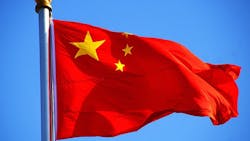China Tells Foreign Firms: Brace for Bigger Competitors
Scouring China’s annual gathering of leaders for clues about business prospects, foreign companies got a clear message: Brace for bigger, stronger local competitors.
Reform of the nation’s $18 trillion state sector will focus on making companies "bigger and better" with mergers and acquisitions pivotal, said the State-Owned Assets Supervision and Administration Commission over the weekend. That plan to create national champions is undermining the confidence of European companies to put more investment in China, said Joerg Wuttke, president of the European Chamber of Commerce in Beijing.
The meeting of parliament that ends March 16 has seen few advances on President Xi Jinping’s past vow to deliver the biggest market opening in two decades. Foreign companies -- already with marginal access in industries from finance to telecoms -- are now up against mercantilist moves including a "Made in China" initiative and periodic attacks from state entities including China Central Television, which March 15Foreign companies -- already with marginal access in industries from finance to telecoms -- are now up against mercantilist moves including a "Made in China" initiative aired an annual program renowned for spearing foreign brands.
"The state champions will become particularly important as the economy slows and smaller firms get absorbed by bigger ones," said Andrew Collier, an independent analyst in Hong Kong and former president of Bank of China International USA. "Western firms are going to have to fight tooth and nail against the pro-China attitude that has permeated the upper echelons of the Chinese leadership."
Foreign Investment
Foreign investment played a pivotal role driving China’s rise as a manufacturing powerhouse since it opened to the world in the late 1970s. That was fortified by accession to the World Trade Organization in 2001, which opened its domestic market to greater competition and helped power a decade of double-digit growth. Service industries were either excluded from the WTO agreement or opened only fractionally.
"In the early 1980s China accepted that it needed foreign investment to make its manufacturing sector internationally competitive," said James Laurenceson, deputy director of the Australia-China Relations Institute at the University of Technology in Sydney. "That instinct proved correct. The jury is still out regarding whether it has reached the same conclusion for services."
As growth slid to a 25-year low in 2015, services made up more than half the economy for the first time. Yet large swaths of such industries, from finance to logistics, are walled off to foreign companies or offer only limited access. Foreign ownership of the booming telecommunications industry is less than 1 percent, Bloomberg Intelligence estimates, while law firms from abroad are prohibited from practicing domestic law.
Past Optimism
Optimism rode high among European businesses when Xi in late 2013 vowed the biggest expansion of economic freedoms since the 1990s, said Wuttke. Free-trade zones opened in Shanghai and other cities subsequently added to the excitement, he said.
While there’s still plenty of optimism around prospects for per capita consumption, which is seen on the same upward trajectory as Japan in the 1960s and South Korea in the 1970s, foreign businesses are less confident they’ll get to profit from that spending surge.
"There’s still a long stretch of strong growth possibly in the system unless policy mistakes devalues that opportunity," said Wuttke. "The question is: Are we going to witness this and benefit or are we going to be outside the glass door and just see it unfolding?"
China also is shifting up the value-added ladder into industries where foreign firms are now dominant. Xi’s "Made in China 2025" blueprint envisions global competitiveness within a decade in 10 industries from machine tools and robots to advanced railway equipment and medical devices.
A stronger emphasis on national security, increasing domestic competition, and Chinese companies catching up on research and development with foreign rivals indicate the golden days for foreign companies in China are over, said Zhu Ning, a professor of finance at the Beijing campus of the Shanghai Advanced Institute of Finance.
"Their market share may very likely diminish over time despite quickly growing overall revenues and profits," he said.
About the Author
Bloomberg
Licensed content from Bloomberg, copyright 2016.
